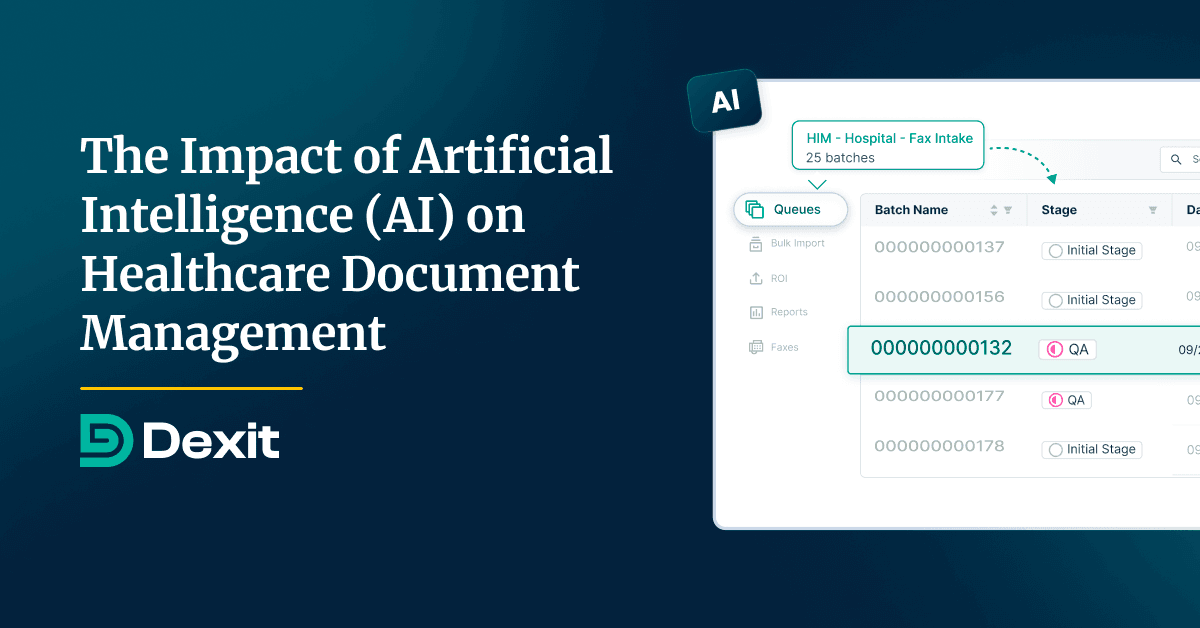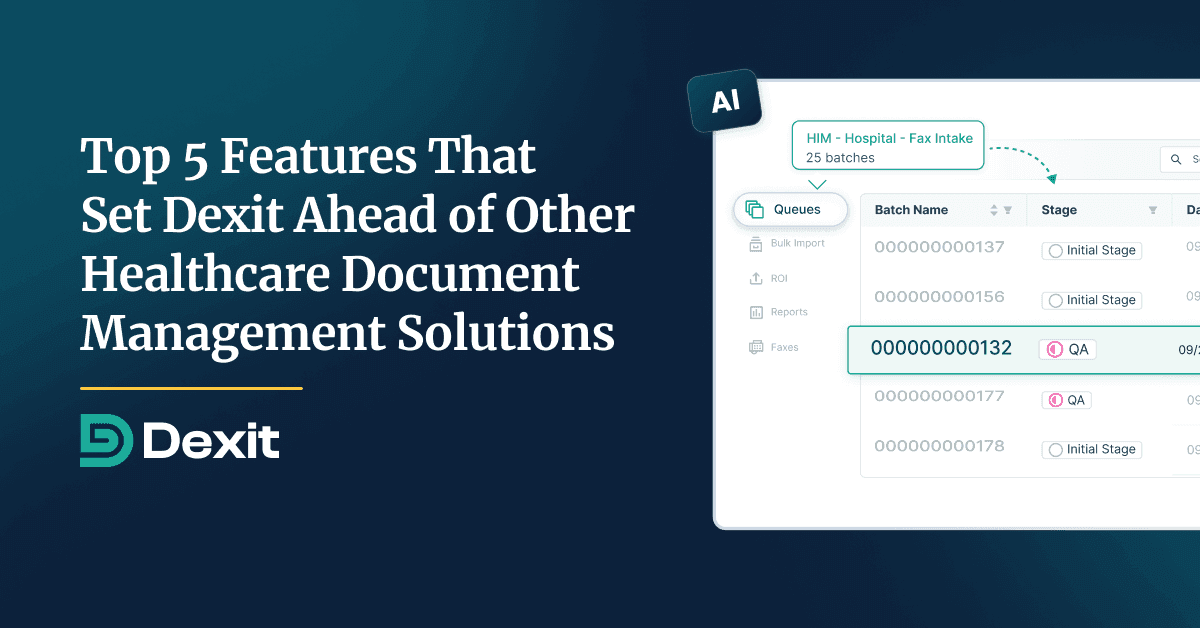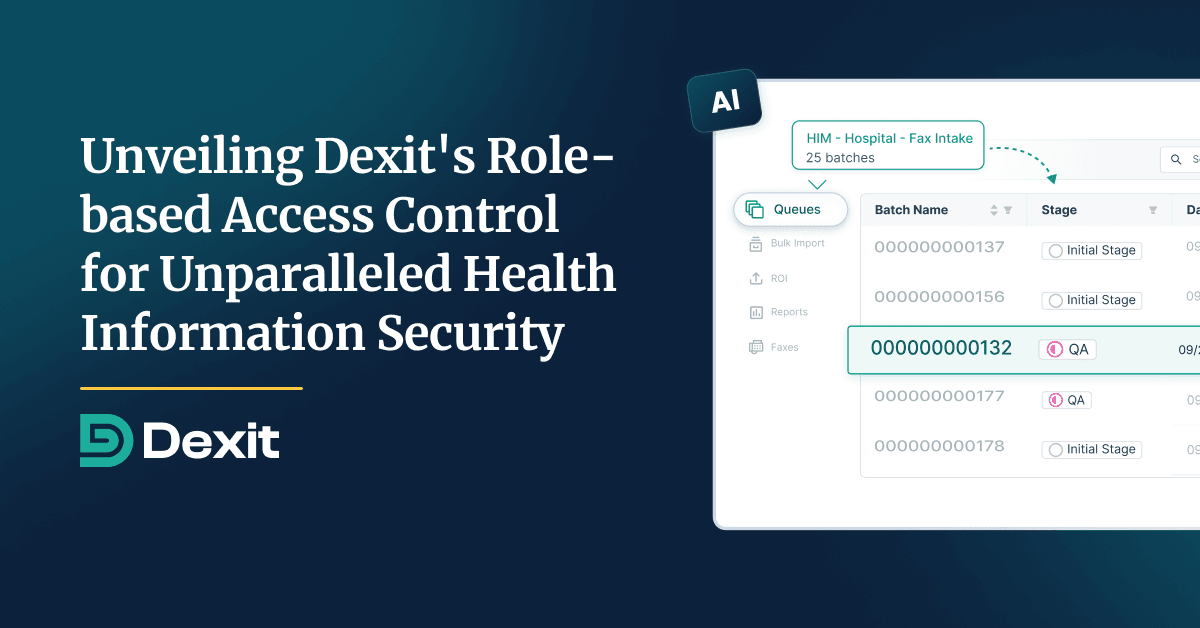
5 Tips to Master Automated Document Processing in Healthcare Facilities
When it comes to the healthcare landscape, administrative burdens can significantly hinder efficiency and …

The advent of Artificial Intelligence (AI) has signaled a revolutionary shift across various sectors, with the healthcare industry standing at the forefront of this transformation. In the domain of healthcare document management, AI's impact is particularly profound, streamlining operations and augmenting the ability to curate, retrieve, and utilize patient data with unprecedented efficiency.
By harnessing the power of machine learning and Natural Language Processing (NLP), AI applications transform bulky paper trails into smart, accessible digital archives. This leap forward not only enhances patient care by providing timely access to health information but also paves the way for advanced analytics, personalized medicine, and improved healthcare outcomes.
The introduction of AI in healthcare document management is not a fleeting trend—it is an essential evolution, shaping the future of how healthcare providers manage information. In today’s blog, we’ll delve into the various challenges that currently exist in the healthcare document management space and how AI helps to overcome those challenges.
Explore:
Healthcare document management faces several significant challenges that impede efficiency and quality of care. One key issue is the sheer volume of paperwork generated in healthcare settings, ranging from patient records to administrative documents, which can overwhelm traditional manual filing systems and lead to errors or delays in accessing critical information.
Additionally, ensuring compliance with ever-evolving healthcare regulations adds complexity, as healthcare providers must navigate a labyrinth of legal requirements while maintaining confidentiality and security standards.
Here are some of the existing challenges in the healthcare document management industry:
1. Data security: Healthcare documents, rich with sensitive patient information, are prime targets for cyberattacks. Robust security measures like encryption, access controls, and regular audits are vital for safeguarding patient data. AI-driven security solutions continuously monitor system activity, detect anomalies, and swiftly identify potential threats. Machine learning algorithms analyze behavioral patterns to flag unauthorized access or suspicious activities, bolstering data security.
2. Interoperability: Interoperability in healthcare document management poses a challenge due to the multitude of systems and formats used for storing and sharing patient data across different healthcare providers and institutions. Ensuring seamless communication and exchange of information between these disparate systems requires standardization of protocols and formats, which often proves difficult to achieve. AI-powered solutions can standardize data formats, translate between systems, and facilitate smooth data exchange. NLP algorithms extract relevant information from unstructured documents for integration into EHR systems.
3. Document Retrieval and Accessibility: Quick and easy access to patient records is crucial for providing timely care. Healthcare document management systems must facilitate efficient document retrieval while ensuring proper access controls to protect patient privacy. AI-driven search engines improve document retrieval with intelligent capabilities. Natural Language Processing enables semantic search, enhancing accuracy and efficiency by understanding context. This boosts accessibility for healthcare providers.
4. Document Capture and Digitization: Converting paper-based documents into digital formats can be time-consuming and error-prone. Document Management Systems (DMS) should support efficient document capture and digitization processes to minimize manual effort and ensure data accuracy. AI, like OCR and IDR, automates the conversion of paper documents to digital formats. They accurately extract text, images, and data from scans, cutting down on manual entry time and effort.
5. Document Version Control: Healthcare documents often undergo revisions and updates, leading to multiple versions of the same document. Maintaining version control is essential to ensure that healthcare providers have access to the most current and accurate information. AI version control systems track changes, manage revisions, and identify the latest version automatically. Machine learning algorithms analyze document histories to ensure healthcare providers access the most relevant information.
6. Mobile Access: Healthcare professionals rely more on mobile devices to access and collaborate on patient information. Document systems need mobile-friendly interfaces and secure access. AI-powered mobile apps offer secure access to healthcare documents and patient records. They use AI, including biometric authentication and encryption, for data security, allowing professionals to access critical information anywhere.
AI can revolutionize the healthcare sector by offering a multitude of advantages in the management of medical documentation. The implementation of Artificial Intelligence (AI) in document management streamlines operations, increases efficiency, and supports better patient outcomes.
Here are the significant benefits explained in detail:
The future of AI in the healthcare document management space holds immense promise and potential for revolutionizing the way medical records are handled. AI technologies such as Natural Language Processing (NLP) and machine learning algorithms can significantly streamline document management processes by automating tasks such as data extraction, classification, and indexing.
This not only reduces the time and resources required for managing vast amounts of medical records but also enhances accuracy and efficiency. Additionally, AI-powered document management systems can improve accessibility to patient information, ensuring that healthcare professionals have timely access to relevant data for informed decision-making.
Furthermore, AI-driven analytics can provide valuable insights into healthcare trends, patient outcomes, and treatment efficacy, aiding in personalized patient care and driving advancements in medical research. As AI continues to evolve and integrate further into healthcare systems, the future of document management holds the promise of more efficient, accurate, and patient-centered healthcare delivery.
The integration of Artificial Intelligence (AI) into healthcare document management represents a pivotal moment in the evolution of the healthcare industry. The transformative impact of AI technologies such as machine learning and Natural Language Processing (NLP) is evident in their ability to address existing challenges, enhance operational efficiency, and ultimately improve patient care outcomes. As we navigate the complexities of managing vast amounts of medical data, AI emerges not only as a solution but as a catalyst for innovation, driving us toward a future where healthcare delivery is more personalized, efficient, and accessible than ever before.
With continued advancements in AI and its integration into healthcare systems, we stand poised to witness further strides in document management, paving the way for a more seamless, secure, and patient-centric healthcare experience.
Join over 3,200 subscribers and keep up-to-date with the latest innovations & best practices in Healthcare IT.

When it comes to the healthcare landscape, administrative burdens can significantly hinder efficiency and …

With the advent of advanced healthcare document management technologies, Health Information Management (HIM) …

Sensitive patient information privacy and security are paramount concerns of the Health Information Management …